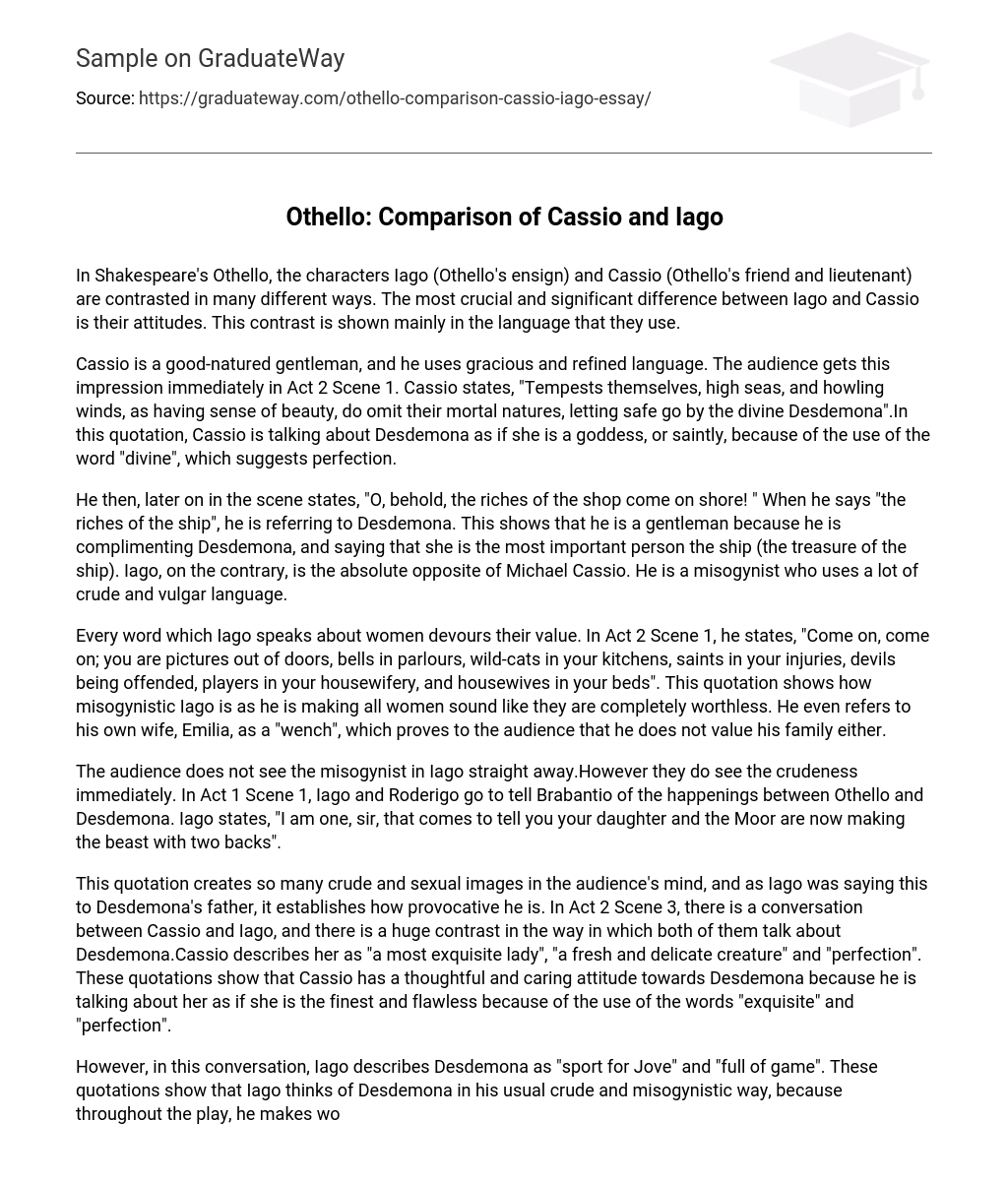In Shakespeare’s Othello, the characters Iago (Othello’s ensign) and Cassio (Othello’s friend and lieutenant) are contrasted in many different ways. The most crucial and significant difference between Iago and Cassio is their attitudes. This contrast is shown mainly in the language that they use.
Cassio is a good-natured gentleman, and he uses gracious and refined language. The audience gets this impression immediately in Act 2 Scene 1. Cassio states, “Tempests themselves, high seas, and howling winds, as having sense of beauty, do omit their mortal natures, letting safe go by the divine Desdemona”.In this quotation, Cassio is talking about Desdemona as if she is a goddess, or saintly, because of the use of the word “divine”, which suggests perfection.
He then, later on in the scene states, “O, behold, the riches of the shop come on shore! ” When he says “the riches of the ship”, he is referring to Desdemona. This shows that he is a gentleman because he is complimenting Desdemona, and saying that she is the most important person the ship (the treasure of the ship). Iago, on the contrary, is the absolute opposite of Michael Cassio. He is a misogynist who uses a lot of crude and vulgar language.
Every word which Iago speaks about women devours their value. In Act 2 Scene 1, he states, “Come on, come on; you are pictures out of doors, bells in parlours, wild-cats in your kitchens, saints in your injuries, devils being offended, players in your housewifery, and housewives in your beds”. This quotation shows how misogynistic Iago is as he is making all women sound like they are completely worthless. He even refers to his own wife, Emilia, as a “wench”, which proves to the audience that he does not value his family either.
The audience does not see the misogynist in Iago straight away.However they do see the crudeness immediately. In Act 1 Scene 1, Iago and Roderigo go to tell Brabantio of the happenings between Othello and Desdemona. Iago states, “I am one, sir, that comes to tell you your daughter and the Moor are now making the beast with two backs”.
This quotation creates so many crude and sexual images in the audience’s mind, and as Iago was saying this to Desdemona’s father, it establishes how provocative he is. In Act 2 Scene 3, there is a conversation between Cassio and Iago, and there is a huge contrast in the way in which both of them talk about Desdemona.Cassio describes her as “a most exquisite lady”, “a fresh and delicate creature” and “perfection”. These quotations show that Cassio has a thoughtful and caring attitude towards Desdemona because he is talking about her as if she is the finest and flawless because of the use of the words “exquisite” and “perfection”.
However, in this conversation, Iago describes Desdemona as “sport for Jove” and “full of game”. These quotations show that Iago thinks of Desdemona in his usual crude and misogynistic way, because throughout the play, he makes women sound like they are sluts.Jove” is the king of the gods and he is known for his sexual prowess. This shows that he has a careless and unkind attitude towards Desdemona, as he is making her seem insignificant because of his crude language.
Another thing that emphasises the contrast is the way in which they speak. Cassio speaks in a very poetic and perceptive way, whereas Iago is uncomplicated and candid. Not only are Cassio and Iago’s attitudes contrasting, their beliefs are contrasting too. In Act 2 Scene 3, where Cassio has lost his jobs as lieutenant, we hear his beliefs about reputation.
He states, “Reputation, reputation, reputation!O, I have lost my reputation! I have lost the immortal part of myself, and what remains is bestial. My reputation, Iago, my reputation! ” This quotation suggests to the audience that Cassio has a spiritual idea of reputation, because he describes it as an “immortal part” of himself, so he thinks of it as part of his soul or essence (his fundamental nature). The way in which he reacts to losing his job confirms this because he is extremely distressed and he is panicking, and when Iago asks if he is hurt, he replies, “Ay, past all surgery”, which shows that he is feeling mental pain, not physical pain.Iago’s view of reputation is very basic and straight forward.
Both Cassio and Iago’s ideas of reputation more or less sum up their views about other things. For example, their views about women – Cassio is very sensitive and caring to them, and Iago is very blunt and candid to them. The way they speak summarises the views of the characters in a way too, because Cassio is caring so he speaks in a poetic manner (which goes with his spiritual view of reputation), and Iago is crude so he speaks in an uncomplicated and less graceful manner (which goes with his straight forward view of reputation).In conclusion, the differences between Cassio and Iago are portrayed mainly through their attitudes and beliefs about other people (mainly women), and they views about important parts of their lives.
Shakespeare emphasises this contrast with the language and the way in which they speak, and it is very effective as the contrast is obvious to the audience.





